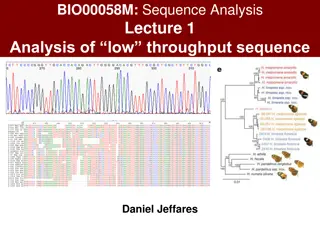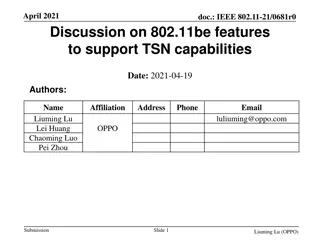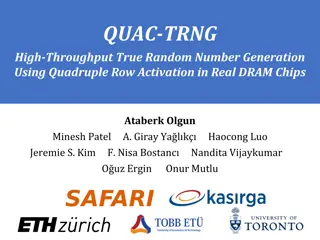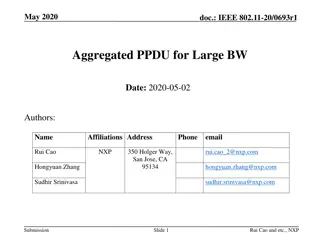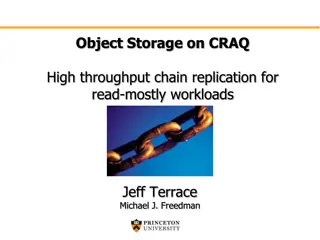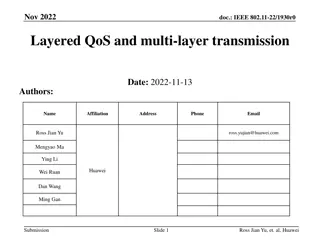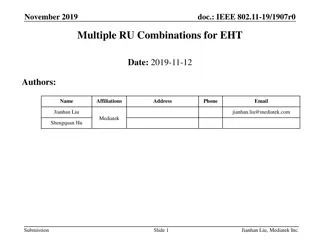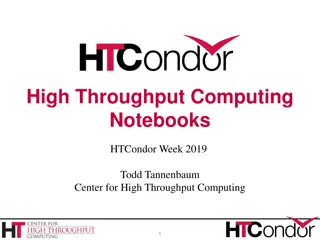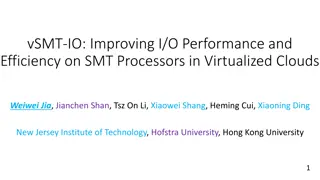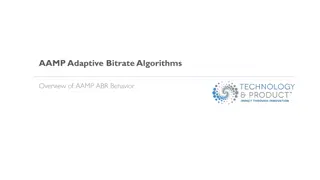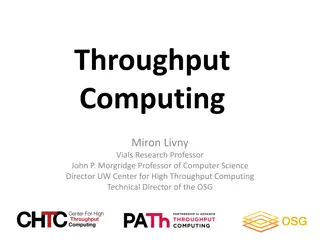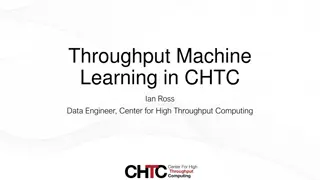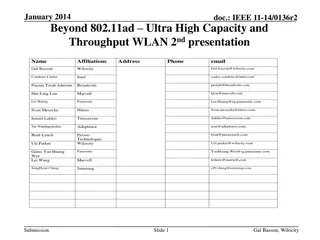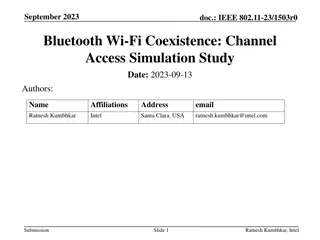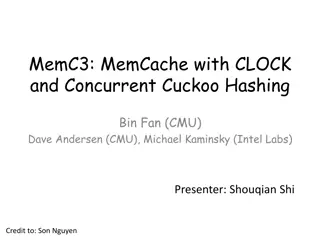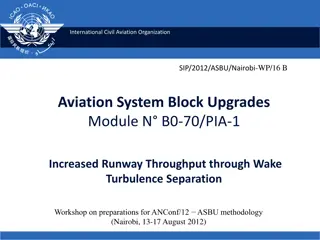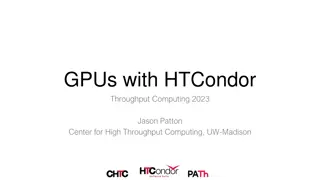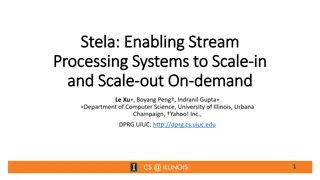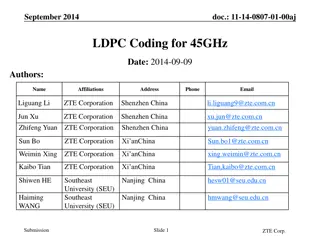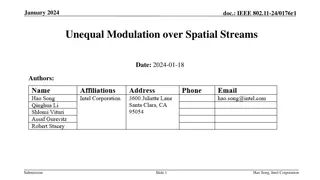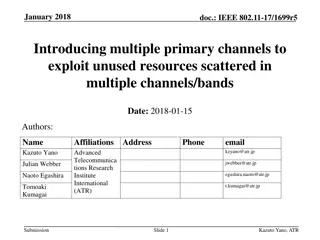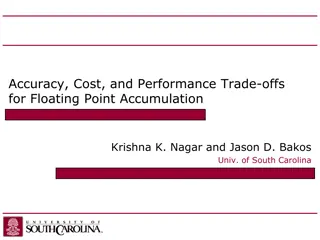Tan Cang Haiphong International Container Terminal Overview
Tan Cang Haiphong International Container Terminal welcomes the delegation from Regional Container Lines in May 2023. The terminal is the first deep-water container terminal in Northern Vietnam, facilitating trade and container throughput. Explore information about Vietnam's GDP growth, internationa
2 views • 20 slides
Channel Information Feedback Enhancement for Improved Beamforming Performance
Beamforming plays a crucial role in achieving high throughput in wireless networks, but issues with discontinuity in beamforming lead to performance limitations. This document discusses the challenges with current beamforming practices and proposes a solution by increasing feedback overhead to enhan
2 views • 17 slides
Transformative Power of Sequencing in Molecular Biology
The falling costs of sequencing have revolutionized various fields like genetics, genomics, cell biology, microbiology, and evolutionary biology. Sequencing data has enabled us to understand genomes, revolutionize cell biology techniques, conduct comparative genomics, population genomics, and metage
1 views • 31 slides
Evolution of Wi-Fi and Cellular Technologies for Next Generation
The document discusses the initiation of a new study group for the next generation of Wi-Fi following IEEE 802.11be, emphasizing objectives like deterministic operation, increased throughput, and capacity. It outlines a timeline for the launch of new mainstream PHY/MAC generations every four years.
6 views • 12 slides
Discussion on IEEE 802.11be Features for TSN Capabilities
IEEE 802.11be introduces features to support Time-Sensitive Networking (TSN) capabilities by enhancing throughput, traffic delivery paths, scheduling flexibility, and latency reduction. The standard addresses the stringent latency requirements of real-time applications, medium access protection, mul
1 views • 10 slides
High-Throughput True Random Number Generation Using QUAC-TRNG
DRAM-based QUAC-TRNG provides high-throughput and low-latency true random number generation by utilizing commodity DRAM devices. By employing Quadruple Row Activation (QUAC), this method outperforms existing TRNGs, achieving a 15.08x improvement in throughput and passing all 15 NIST randomness tests
0 views • 10 slides
Understanding Azure Cosmos DB Billing Components and Request Units
Azure Cosmos DB billing model consists of two main components - Consumed Storage and Provisioned Throughput. You are billed based on the storage consumption and provisioned throughput. Request Units (RUs) abstract physical resources for performing requests, with specific RU costs for different types
0 views • 13 slides
Enhancing Throughput with Aggregated PPDU for Large Bandwidth IEEE 802.11 Networks
This document discusses the implementation of Aggregated PPDU to boost throughput in IEEE 802.11 networks with large bandwidth. The focus is on accommodating various STAs with different operating bandwidths and optimizing traffic flow. By utilizing Aggregated PPDU, significant gains in throughput ca
5 views • 7 slides
Understanding Chain Replication for High Throughput Object Storage
Chain replication is a technique used to achieve high throughput and scalability in object storage systems. It ensures strong consistency by maintaining replicas of data across a chain of nodes, enabling efficient read-mostly workloads. The approach simplifies programming complexity and enhances sys
0 views • 28 slides
Layered QoS and Multi-Layer Transmission in IEEE 802.11-22 for Enhanced WLAN Performance
The document discusses the importance of layered Quality of Service (QoS) and multi-layer transmission in meeting the high throughput and real-time requirements of metaverse applications over WLAN. It emphasizes the need for enhanced throughput, reliability, reduced latency, and improved power effic
0 views • 11 slides
Multiple RU Combinations for Enhanced High Throughput (EHT) in IEEE 802.11-19/1907r0
The document discusses the introduction and design principles for multiple RU combinations in the context of IEEE 802.11-19/1907r0. It explores the considerations and useful scenarios of small-size RU combinations within specified bandwidths, emphasizing the efficiency and complexity balance in the
0 views • 19 slides
Modern Developments and Approaches in Business Environment
This covers topics such as modern manufacturing, costing techniques, continuous quality management, optimizing throughput, externally-focused management approaches, forecasting techniques, pricing decisions, project management, and more. Specific discussions include differences between cost accounti
0 views • 11 slides
Efficient Data Management Strategies for High-Throughput Systems
This content discusses the use of Log-Structured Merge Trees (LSMs) and Bloom Filters in cloud infrastructure to manage high-throughput updates efficiently. It explores strategies such as collecting and batching updates in memory, spilling data from memory to disk, and merging in-memory and on-disk
1 views • 18 slides
Evaluation Metrics for IEEE 802.11-14/0107 HEW Proposal
Evaluation metrics play a crucial role in assessing WLAN system performance and achieving the objectives of High Efficiency WLAN (HEW). This proposal by Yonggang Fang et al. from ZTE outlines the key evaluation metrics recommended for evaluating HEW performance, including area throughput, average th
0 views • 12 slides
Enhancing Throughput in Multi-Hop Wireless Networks Using Reconfigurable Antennas
In this study presented at IEEE SECON 2018, the authors investigate the throughput limits of multi-hop wireless networks employing reconfigurable antennas (RAs). Challenges such as unreliable links, interference, and large overhead are addressed, with existing approaches at both the link/network lay
0 views • 29 slides
Introduction to High Throughput Computing Notebooks with HTCondor
Explore the world of high throughput computing through Jupyter Notebooks, capable of running on laptops or remote servers. Learn to set up personal HTCondor pools, utilize Python bindings, and integrate with JupyterHub for efficient scientific computing.
0 views • 16 slides
Enhancing I/O Performance on SMT Processors in Cloud Environments
Improving I/O performance and efficiency on Simultaneous Multi-Threading (SMT) processors in virtualized clouds is crucial for maximizing system throughput and resource utilization. The vSMT-IO approach focuses on efficiently scheduling I/O workloads on SMT CPUs by making them "dormant" on hardware
0 views • 31 slides
Overview of Adaptive Bitrate Algorithms and ABR Design for Video Streaming
This content provides insights into the Adaptive Bitrate Algorithms (AAMP) and ABR Design, focusing on behaviors, throughput considerations, network consistency, profile selection, buffering strategies, and hybrid approaches. It covers topics such as segment downloading, network throughput estimatio
0 views • 5 slides
Amusement Park Attraction Simulation Project Overview
This project focuses on optimizing an amusement park attraction through simulation modeling using Simio. Objectives include adjusting system parameters to enhance ride efficiency, improve customer throughput, and maximize utilization of the presentation room. Key performance measures center around m
0 views • 20 slides
Understanding Blockchain Scaling: Throughput Enhancement Strategies
Explore the concept of scaling throughput in blockchain technology through a detailed analysis of Bitcoin and Ethereum performance, limitations in throughput, security implications related to forking, and innovative solutions like GHOST protocol to enhance network efficiency and security.
0 views • 18 slides
Advancing High Throughput Computing: A Revolution in Job Handling
Explore the evolution of High Throughput Computing (HTC) through milestones like the formation of the OSG Consortium and the Partnership to Advance Throughput Computing (PATh). Discover how the PATh project aims to innovate and expand Distributed HTC technologies for Science & Engineering goals. Div
0 views • 13 slides
Exploring Throughput Machine Learning in High-Throughput Computing
Explore the applications of Artificial Intelligence and Machine Learning in the context of High-Throughput Computing (CHTC). Learn about AI/ML methodologies, deep learning, data engineering, and their roles in enabling novel scientific advancements. Discover use cases, ongoing work, and future plans
0 views • 28 slides
Performance Aspects of Multi-link Operations in IEEE 802.11-19/1291r0
This document explores the performance aspects, benefits, and assumptions of multi-link operations in IEEE 802.11-19/1291r0. It discusses the motivation for multi-link operation in new wireless devices, potential throughput gains, classification of multi-link capabilities, and operation modes. The s
0 views • 30 slides
Beyond 802.11ad: Ultra High Capacity and Throughput WLAN
The document from January 2014 discusses the exploration of modifications to IEEE 802.11ad-2012 PHY and MAC layers to enable modes of operation in the 60 GHz band capable of achieving a maximum throughput of at least 30 Gbps while maintaining the band's excellent capacity attributes. Topics include
0 views • 21 slides
Channel Access Simulation Study for Bluetooth-Wi-Fi Coexistence in IEEE 802.11-23
A detailed simulation study was conducted to analyze the coexistence of Bluetooth and Wi-Fi in the IEEE 802.11-23 standard. The study covered aspects such as channel access, transmission setup, Bluetooth-Wi-Fi interactions, impact on latency, throughput, and observations on performance under various
0 views • 14 slides
Enhancing Goodput with HTCSS and Adstash in High Throughput Computing
Explore how utilizing HTCSS and Adstash can boost goodput in high throughput computing environments. Learn about usage reporting with accounting ads, storing job history in Elasticsearch, and common challenges to overcome. Discover insights on CPU core hours delivery, GPU usage, memory analytics, us
0 views • 27 slides
Enhancing Key-Value Storage with MemC3 and Cuckoo Hashing
MemC3 is a specialized key-value store that combines CLOCK and Concurrent Cuckoo Hashing to improve performance and efficiency. Memcached, an established DRAM-based key-value store, is also discussed along with its LRU eviction strategy. The use of internal chaining hashtable and LRU caching in Memc
1 views • 23 slides
Enhanced Runway Throughput via Wake Turbulence Separation Module N.B0-70
This document discusses Module N.B0-70 of the ASBU methodology by ICAO, focusing on increased runway throughput through revised wake turbulence separation standards and procedures. The module addresses the need for more efficient spacing and sequencing of aircraft during approach and en-route operat
0 views • 12 slides
Maximizing GPU Throughput with HTCondor in 2023
Explore the integration of GPUs with HTCondor for efficient throughput computing in 2023. Learn how to enable GPUs on execution platforms, request GPUs for jobs, and configure job environments. Discover key considerations for jobs with specific GPU requirements and how to allocate GPUs effectively.
0 views • 22 slides
Enhancing Stream Processing Systems with On-Demand Scalability
This study explores the importance of elasticity and on-demand scaling in stream processing systems, focusing on the development of the Stela system. It introduces novel metrics like Effective Throughput Percentage (ETP) and describes the implementation of on-demand elasticity within Storm without t
0 views • 26 slides
Managing Business Process Flows - Throughput and Capacity Analysis
Explore the concepts of throughput and capacity from the book "Managing Business Process Flows" through a detailed lecture discussing utilization, inventory, flow time, and Little's Law. The analysis includes scenarios like computing average inventory, theoretical flow time, handling contracts per d
0 views • 9 slides
LDPC Coding for 45GHz: Enhancing Throughput and Performance
Background information on LDPC coding in IEEE standards and the challenges faced in existing LDPC codes, particularly in terms of decoding throughput, complexity, and performance. The proposed solution introduces new base matrices with specific features to improve system efficiency and reliability,
0 views • 23 slides
Tradeoffs in CDN Designs for Throughput-Oriented Traffic
Understanding the evolving nature of throughput-oriented traffic on the Internet is crucial as video content dominates consumer traffic. This study delves into identifying and addressing throughput bottlenecks at the client, network, and server levels. It emphasizes the importance of improving netwo
0 views • 27 slides
IEEE 802.11-17: Enhancing Multi-Link Operation for Higher Throughput
The document discusses IEEE 802.11-17/xxxxr0 focusing on multi-link operation for achieving higher throughput. It covers motions adopted in the SFD related to asynchronous multi-link channel access, mechanisms for multi-link operation, and shared sequence number space. Additionally, it explores the
0 views • 14 slides
Understanding Network Latency and Delays
Dive into the world of computer networking with this informative Q&A session from a CS 332 class. Explore concepts such as network latency, access vs. queuing delays, the different kinds of delays, goodput, and the relationship between capacity and throughput. Gain insights into how propagation dela
0 views • 45 slides
Maximizing Throughput in IEEE 802.11 Networks Through Unequal Modulation Strategies
The documents discuss the benefits of using unequal modulation over spatial streams in IEEE 802.11 networks to enhance throughput. Unequal modulation allows for adapting modulation schemes based on Signal-to-Noise Ratio (SNR) conditions, optimizing MIMO gains and coding rates for each spatial stream
0 views • 10 slides
Exploring Bringing Your Own Capacity in High-Throughput Computing
Researchers are increasingly interested in accessing compute capacity outside of their usual systems in high-throughput computing. This exploration delves into the history, phases, and initial experiments of bringing external capacity to the Open Science Pool, detailing the process and challenges fa
0 views • 18 slides
Enhancing Wireless LAN Throughput with Multiple Primary Channels
This document discusses the need for increasing system throughput in wireless LAN networks due to the growing demand for WLAN traffic. By introducing multiple primary channels, unused resources scattered across various channels can be exploited to improve quality of service and enhance transmission
0 views • 20 slides
Integrating WUR into IEEE 802.11bn for Enhanced Network Efficiency
IEEE 802.11-24/0892r0 proposes integrating Wake-Up Radio (WUR) technology into 11bn networks to improve reliability, support low latency traffic, increase peak throughput, and enhance power-saving capabilities. The WUR acts as a companion radio to the main connectivity radio, enabling power-saving w
0 views • 10 slides
Trade-offs in Floating Point Accumulation: Balancing Accuracy, Cost, and Performance
When designing floating point accumulation systems, achieving high throughput and accuracy presents a challenging trade-off. Inconsistent accuracy due to data dependencies can lead to significant errors in results. Strategies such as compensated summation or using extended precision adders can help
0 views • 11 slides


